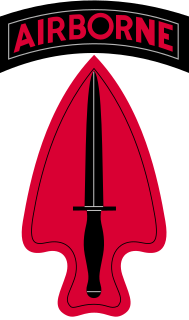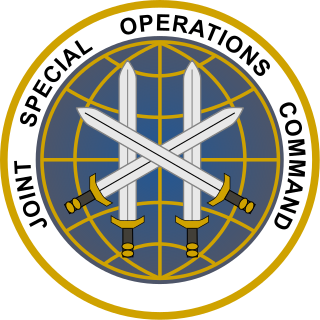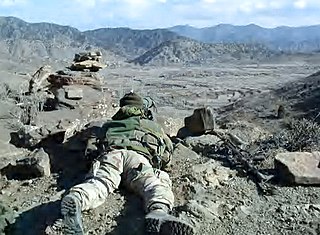
The United States Navy Sea, Air, and Land (SEAL) Teams, commonly known as Navy SEALs, are the U.S. Navy's primary special operations force and a component of the Naval Special Warfare Command. Among the SEALs' main functions are conducting small-unit special operation missions in maritime, jungle, urban, arctic, mountainous, and desert environments. SEALs are typically ordered to capture or to eliminate high level targets, or to gather intelligence behind enemy lines.

The United States Army Special Forces, colloquially known as the "green berets" due to their distinctive service headgear, are a special operations force of the United States Army that are designed to deploy and execute 9 doctrinal missions: unconventional warfare, foreign internal defense, direct action, counter-insurgency, special reconnaissance, counter-terrorism, information operations, counterproliferation of weapons of mass destruction, and security force assistance. The first two missions, unconventional warfare and foreign internal defenses emphasize language, cultural, and training skills in working with foreign troops. Other Special Forces missions, known as secondary missions, include: combat search and rescue (CSAR), counter-narcotics, hostage rescue, humanitarian assistance, humanitarian demining, information operations, peacekeeping, and manhunts. Other components of the United States Special Operations Command (USSOCOM) or other U.S. government activities may also specialize in these secondary missions. The Special Forces conduct these missions via seven geographically focused groups. Many of their operational techniques are classified, but some nonfiction works and doctrinal manuals are available.

The 1st Special Forces Operational Detachment-Delta, commonly referred to as Delta Force, Combat Applications Group (CAG), "The Unit", Army Compartmented Element (ACE), or within JSOC as Task Force Green, is an elite special operations force of the United States Army, under operational control of the Joint Special Operations Command. The unit is tasked with specialized missions primarily involving counter-terrorism, hostage rescue, direct action, and special reconnaissance, often against high-value targets. Delta Force and its Navy and Air Force counterparts, DEVGRU and 24th Special Tactics Squadron, are the U.S. military's primary Tier 1 special mission units tasked with performing the most complex, classified, and dangerous missions directed by the National Command Authority.

The United States Army Special Operations Command (Airborne) (USASOC) is the command charged with overseeing the various special operations forces of the United States Army. Headquartered at Fort Bragg, North Carolina, it is the largest component of the United States Special Operations Command. It is an Army Service Component Command. Its mission is to organize, train, educate, man, equip, fund, administer, mobilize, deploy and sustain Army special operations forces to successfully conduct worldwide special operations.

The United States Naval Special Warfare Command (NAVSPECWARCOM), also known as NSWC or WARCOM is the Naval component of United States Special Operations Command, the unified command responsible for overseeing and conducting the nation's special operations and missions.

The Marine Corps Special Operations Command Detachment One, also simply known as Det One, was a pilot program of attaching a permanent unit of the United States Marine Corps to the United States Special Operations Command. It was commanded by Col. Robert J. Coates, former commanding officer of 1st Force Reconnaissance Company. Det One was activated on 19 June 2003 and had its headquarters at Camp Del Mar Boat Basin in Camp Pendleton, California. It was disbanded in 2006 and succeeded by the permanent United States Marine Corps Forces Special Operations Command (MARSOC).

The Joint Special Operations Command (JSOC) is a joint component command of the United States Special Operations Command (USSOCOM) and is charged to study special operations requirements and techniques to ensure interoperability and equipment standardization; to plan and conduct special operations exercises and training; to develop joint special operations tactics; and to execute special operations missions worldwide. It was established in 1980 on recommendation of Colonel Charlie Beckwith, in the aftermath of the failure of Operation Eagle Claw. It is located at Pope Field.

Navy Expeditionary Combat Command (NECC) serves as the single functional command to centrally manage current and future readiness, resources, manning, training and equipping of the United States Navy's 21,000 expeditionary forces who are currently serving in every theater of operation. The NECC was established in January 2006. NECC is a subordinate command of the Navy's Fleet Forces Command.
The term Special Mission Unit or Special Missions Unit (SMU) is a term sometimes used, particularly in the United States, to describe some military Special Operations Forces. Special mission units have been involved in high-profile military operations such as the killing of Osama Bin Laden.

Special reconnaissance (SR) is conducted by small units of highly trained military personnel, usually from special forces units or military intelligence organizations, who operate behind enemy lines, avoiding direct combat and detection by the enemy. As a role, SR is distinct from commando operations, but both are often carried out by the same units. The SR role frequently includes covert direction of air and missile attacks, in areas deep behind enemy lines, placement of remotely monitored sensors, and preparations for other special forces. Like other special forces, SR units may also carry out direct action and unconventional warfare, including guerrilla operations.
National governments deal in both intelligence and military special operations functions that either should be completely secret, or simply cannot be linked to the sponsor. It is a continuing and unsolved question for governments whether clandestine intelligence collection and covert action should be under the same agency. The arguments for doing so include having centralized functions for monitoring covert action and clandestine HUMINT and making sure they do not conflict, as well as avoiding duplication in common services such as cover identity support, counterespionage, and secret communications. The arguments against doing so suggest that the management of the two activities takes a quite different mindset and skills, in part because clandestine collection almost always is on a slower timeline than covert action.
In United States military doctrine, unconventional warfare is one of the core activities of irregular warfare. Unconventional warfare is essentially support provided by the military to a foreign insurgency or resistance. The legal definition of UW is:
Unconventional Warfare consists of activities conducted to enable a resistance movement or insurgency to coerce, disrupt or overthrow an occupying power or government by operating through or with an underground, auxiliary or guerrilla force in a denied area.

Task Force K-Bar, originally the Combined Joint Special Operations Task Force-South (CJSOTF-South), was led by the United States and composed of special operations forces from seven nations. It undertook the first major ground deployment in the War in Afghanistan (2001–present), operating from October 2001 to April 2002.
The United States Marine Corps is assigned by the National Command Authority to be primarily the Department of Defense's expeditionary force-in-readiness, and the Department of the Navy's contingent landing force—amphibious by nature. Before 2006, the Marine Corps was the only branch of the Armed Forces that did not have any of its special warfare elements participating in the United States Special Operations Command (USSOCOM), due to confining its special operations capabilities only for the purpose to the Fleet Marine Force.
The reconnaissance mission within the United States Marine Corps is divided into two distinct but complementary aspects; Marine Division Recon and Force Reconnaissance.
The Special Forces branch of the Maldives National Defence Force is the elite Special Forces and Airborne unit which is renowned of being capable of planning and conducting a broad range of special operations across the operational continuum. They are specialized in carrying unconventional warfare, counter-terrorism, counter insurgency, hostage rescues operations and other specialist tactical warfare operations.

Special forces and special operations forces (SOF) are military units trained to conduct special operations. NATO has defined special operations as "military activities conducted by specially designated, organized, trained, and equipped forces, manned with selected personnel, using unconventional tactics, techniques, and modes of employment".

The Armed Forces of the Philippines Special Operations Command is the unified special operations command of the armed forces. It is responsible for planning, conducting, and supporting special operations. Although the current command was established in April 2018, the date marked as the official anniversary of AFPSOCOM is January 16, 1978. The same date the Philippine Army Special Warfare Brigade (ASWABde) was organized, to which AFPSOCOM traces its origin.

The Naval Special Warfare Development Group (NSWDG), abbreviated as DEVGRU and commonly known as SEAL Team Six, is the United States Navy component of the Joint Special Operations Command (JSOC). The unit is often referred to within JSOC as Task Force Blue. DEVGRU is administratively supported by Naval Special Warfare Command and operationally commanded by the Joint Special Operations Command. Most information concerning DEVGRU is designated as classified information, and details of its activities are not usually commented on by either the United States Department of Defense or the White House. Despite the official name changes, "SEAL Team Six" remains the unit's widely recognized moniker.

The United States Special Operations Command is the unified combatant command charged with overseeing the various special operations component commands of the Army, Marine Corps, Navy, and Air Force of the United States Armed Forces. The command is part of the Department of Defense and is the only unified combatant command created by an Act of Congress. USSOCOM is headquartered at MacDill Air Force Base in Tampa, Florida.













